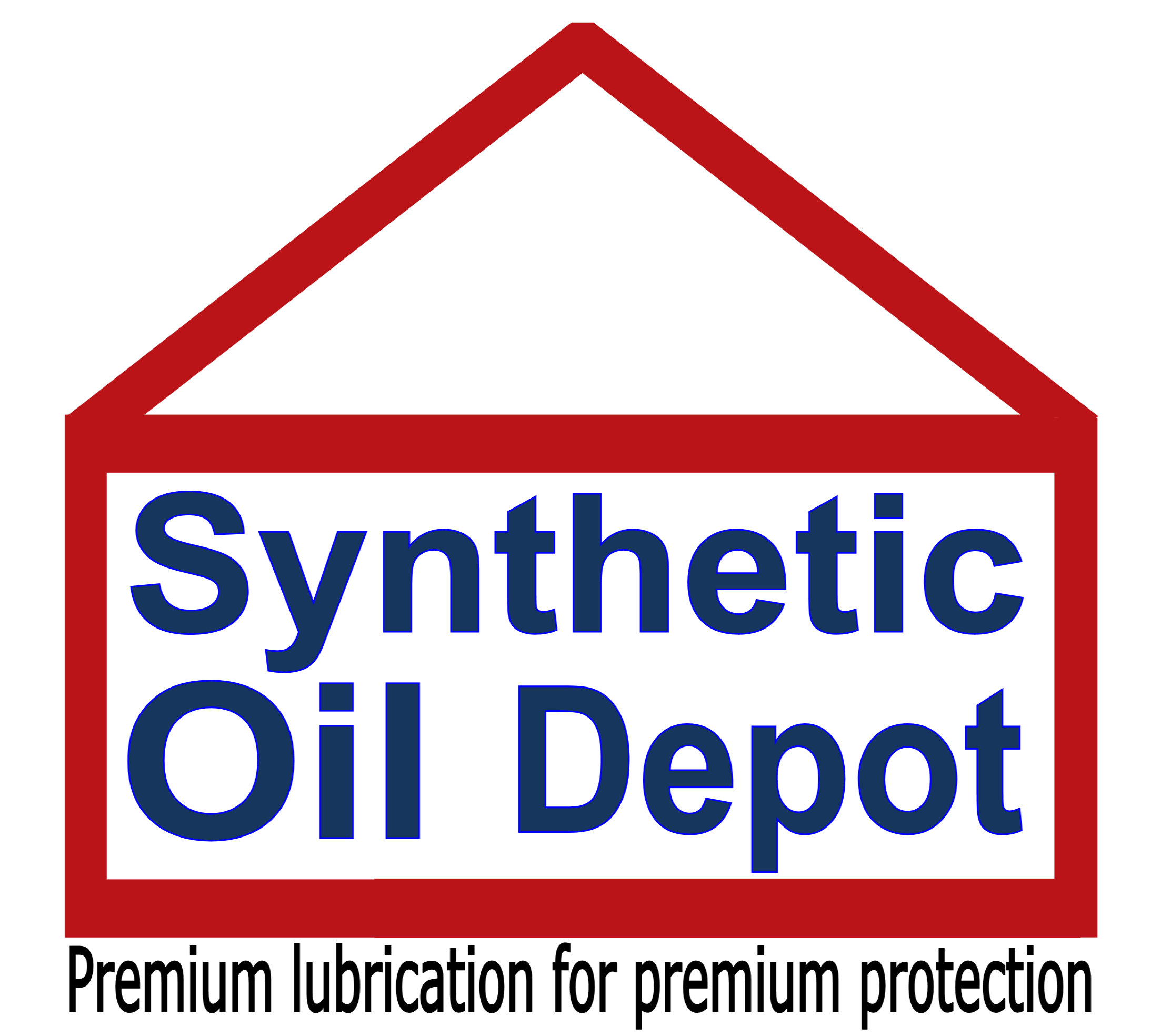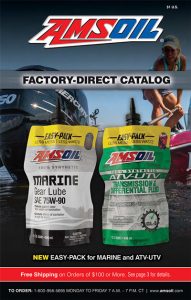AMSOIL Frequently Asked Questions
In this Section you will find answers to some of the most frequently asked questions about AMSOIL Products.
AMSOIL products have been available since 1972, when AMSOIL 10W-40 Synthetic Motor Oil became the first synthetic motor oil to meet American Petroleum Institute (API) service requirements. Today, AMSOIL manufactures synthetic lubricants for virtually all automotive, powersports, commercial and industrial applications.
Motor oil, whether synthetic or petroleum-based, consists of molecular chains of hydrogen and carbon atoms, referred to as hydrocarbons. Petroleum crude oil is a thick, highly flammable dark-brown or greenish liquid with high energy density. Many contaminating elements exist in this complex mixture of hydrocarbons, including sulfur, nitrogen, oxygen and metal components such as nickel or vanadium. Petroleum crude oil is the raw material used for a wide variety of petrochemicals, including solvents, fertilizers, plastics and lubricants.
The oil refining process separates the various types of molecules in the oil by weight, resulting in a concentrated batch suitable for manufacturing products such as gasoline, LPG, kerosene or lubricant base oils. The chemical composition of conventional motor oil can vary substantially depending on the raw crude oil refining process.
While petroleum base oils are refined, synthetic base oils are manufactured and can achieve a higher performance level. Synthetic oil is chemically engineered for a certain molecular composition with a tailored and uniform structure. Such fine-tuned control over the final molecular composition of synthetic oils is the key to their superior performance properties. Designing molecular structures in a planned and orderly fashion results in molecules, and end-products, that are far more stable than their refined petroleum counterparts.
Most lubricating oils have other chemicals added to improve the overall performance of the fluid. Chemical additives are used to enhance the beneficial properties of the base oil or to make up for oil deficiencies. For passenger car motor oils, base oil makes up 70 to 80 percent of the final product; the other 20 to 30 percent is comprised of additive chemistry.
Additives help lubricants stand up to extreme operating environments. Even the best base oil would not be able to protect as well against the effects of heat, shearing forces, chemical and water dilution, corrosion and wear particles. In short, additives make good base oils even better. They give good base oils the performance benefits consumers have come to expect, such as multi-grade performance, extended drain intervals and extreme-pressure performance.
Anti-wear Agents chemically react to form a film barrier that prevent metal-to-metal contact and wear.
Antioxidants reduce the tendency for oil to react with oxygen and reduce sludge buildup.
Dispersants help suspend and disperse contaminants in the oil to keep engine surfaces free of sludge and deposits. They fight the build-up of corrosive acids and are most efficient at controlling low-temperature deposits.
Detergents help suspend and disperse contaminants in the oil to keep engine surfaces free of sludge and deposits. They are most efficient at controlling high-temperature deposits.
Extreme-Pressure Additives coat metal surfaces to help prevent close-contact components from seizing under extreme pressure. They are activated by high temperatures and high loads to react with the metal’s surface to form a sacrificial wear layer on components.
Foam Inhibitors reduce the surface tension of air bubbles and causes them to collapse.
Friction Modifiers can be used to give oil more ‘slippery’ characteristics. In engine oils, friction modifiers are used to increase the oil’s lubricity for the purpose of reducing friction and improving fuel economy.
Pour Point Depressants give high-viscosity oils good low-temperature properties. Pour point depressant polymers inhibit the formation of crystals to minimize low-temperature viscosity increase.
Rust & Corrosion Inhibitors form a protective barrier over component surfaces to seal out water and contaminants. While most rust and corrosion inhibitors work by forming a physical barrier, some rust inhibitors function by neutralizing acids.
Viscosity Index (VI) Improvers are long-chain polymers that help control the viscosity of multi-grade engine oils. They expand and contract as temperatures vary. High temperatures cause VI improvers to expand and reduce oil thinning; low temperatures cause VI improvers to contract and have little impact on oil viscosity.
Yes. Synthetic oil is perfectly safe for use in both new and high-mileage engines.
No. Synthetic oils do not cause engines to leak oil. In fact, AMSOIL synthetic motor oil is fully compatible with modern seal materials and is properly formulated to condition seals, keeping them pliable to prevent leakage.
Yes. AMSOIL synthetic motor oils are compatible with other conventional and synthetic motor oils. Mixing other oils with AMSOIL motor oils, however, will shorten the oil’s life expectancy and reduce its performance benefits. AMSOIL does not support extended drain intervals where oils have been mixed. Mixing other oils with AMSOIL motor oils will also void the AMSOIL limited warranty.
The importance of using good-quality oil in an engine cannot be overstated. AMSOIL synthetic motor oils consistently outperform conventional and other synthetic oils in virtually every category of performance, including wear protection, extreme high- and low-temperature performance, foam control, viscosity retention, rust and corrosion protection, volatility and fuel economy. While other brands may provide good performance in some of these areas, AMSOIL synthetic motor oils consistently perform at the top in every category. Drivers can have confidence knowing that AMSOIL synthetic motor oils provide maximum performance and protection.
AMSOIL synthetic motor oils are formulated using premium synthetic base oils, and the highest-quality additives, that provide extended-drain capabilities. AMSOIL synthetic motor oils achieve greater cleaning powers, while providing better equipment protection over longer oil drain intervals. The unique synthetic formulation and robust TBN retention of AMSOIL synthetic motor oils work to resist oxidation and neutralize the acids that shorten the service lives of other oils. Their characteristic resistance to high-temperature volatility (burn-off) helps reduce oil consumption, while maintaining viscosity over longer periods of time than other oils.
Check the product data sheet for specific recommendations.
No matter how well motor oil is formulated, it won’t last forever. As the miles accumulate, motor oil begins to degrade and lose its lubricating effectiveness, while the additives are depleted. Severe-service driving conditions accelerate this process. Even with little mileage on the oil, oxidation, gases and moisture take their toll and start the degradation process, making it necessary to set both a mileage and time limit with oil change intervals. Excessive idling, common with fleet vehicles, puts additional stress on the oil, making it necessary to set an hours limit for vehicles subjected to excessive idling. Motor oil and vehicle manufacturers have developed general recommendations for the maximum amount of time or miles that the oil can be used; typically these intervals fall between 3,000 and 7,500 miles, depending on the type of service.
Many AMSOIL synthetic motor oils are specially formulated for extended drain intervals, providing maximum protection longer than other oils. Check the product data sheet for specific recommendations.
AMSOIL maintains formulation details as proprietary and does not divulge specifics regarding the type of synthetic base stocks used in its synthetic lubricants. AMSOIL developed the world’s first API-qualified synthetic motor oil in 1972 and has remained the leader in the synthetic lubricant industry by continually researching new technologies and demanding only the highest-quality raw materials. As the company moves forward with new technologies it is increasingly more important that this information remains proprietary. AMSOIL views synthetic base oils the same as it views additives, with each having its own set of unique properties. AMSOIL does not insist on a particular type of base stock, but insists on particular performance parameters. AMSOIL chooses whichever synthetic base stock or combination of base stocks delivers the desired result and tailors its lubricants to be application-specific (gasoline, diesel, racing, transmission, gear, extended drain, extreme temperatures, etc.). At the end of the day, the type of base stock used to formulate the oil is inconsequential; the product’s performance is what matters.
Each vehicle manufacturer defines “normal” and “severe” driving conditions for its equipment; AMSOIL recommends owners check these definitions in their owner’s manual to determine the service condition in which they typically drive.
AMSOIL defines normal service as personal vehicles frequently traveling greater than 10 miles (16 km) at a time and not operating under severe service.
AMSOIL defines severe service for gasoline engines as conditions that include commercial or fleet vehicles; excessive idling; or frequent towing, hauling, plowing or driving in dusty conditions.
AMSOIL defines severe service for diesel engines as extensive engine idling, daily short-trip driving less than 10 miles (16km) or frequent dusty-condition driving.
Read this article to learn more on drain intervals and how normal and severe service effect them.
See the AMSOIL Product Recommendation and Drain Interval Chart for additional information.
AMSOIL synthetic motor oils can reduce oil consumption in mechanically sound engines. However, AMSOIL synthetic motor oils cannot fix engines that consume oil due to mechanical problems.
SWITCHING TO AMSOIL (new, used and high mileage)
Yes. Synthetic oil is perfectly safe for use in both new and high-mileage engines. In fact, many new cars come factory filled with synthetics.
No. AMSOIL synthetic motor oils can be safely used during break-in. In fact, many vehicles, including the Dodge Viper and Chevrolet Corvette, are factory-filled with synthetic oil.
There are no special requirements for changing to AMSOIL synthetic motor oil. However, in older vehicles with high mileage, it may be advisable to use AMSOIL Engine and Transmission Flush first. This will ensure the engine is clean and free of accumulated contaminants that may affect the service life of AMSOIL synthetic motor oil. Installation of an AMSOIL Ea Oil Filter at every oil change is also recommended.
Absolutely not. Switching from petroleum oil to AMSOIL synthetic motor oil in routinely maintained vehicles will not cause clogged oil filters or passageways, regardless of mileage. Sludge, which is caused by poor-quality oil and neglected maintenance practices, would have to be present in significant amounts to plug oil filters and passageways. If an excessive amount of sludge is present in an engine, it is just a matter of time before oil filters and passageways clog, regardless of the installation of AMSOIL synthetic motor oil.
OIL CONSUMPTION
What may be considered normal oil consumption for one vehicle may be excessive for another. As a rule, the more miles and wear accumulated on an engine, the more oil that engine consumes. Typically, one quart of oil within 3,000 miles is normal, but it is best to confirm oil consumption limits with the vehicle manufacturer. The following document explains mechanical-related issues that can lead to oil consumption: Engine Oil Consumption
AMSOIL synthetic motor oils can reduce oil consumption in mechanically sound engines. However, AMSOIL synthetic motor oils cannot fix engines that consume oil due to mechanical problems.
Gasoline passenger vehicles / pickups
Yes. Because AMSOIL synthetic motor oils are formulated with premium synthetic base oils, they provide superior high and low-temperature performance. Synthetic oils resist thinning out at high temperatures to maintain critical protection in extreme heat. They also minimize sludge and deposit formation in high-temperature operation. AMSOIL synthetic motor oils resist thickening in cold temperatures to provide rapid cold starts and improved low-temperature operation compared to conventional oils.
The “W” in 5W-30 motor oil stands for “winter” and indicates the oil meets or exceeds certain criteria for good low-temperature performance. Motor oil with SAE viscosity grade 5W-30 behaves like an SAE 30 oil at high temperatures and SAE 5W oil at low temperatures, providing the necessary fluidity for rapid starts and efficient engine operation at low temperatures.
AMSOIL OE Synthetic Motor Oil is recommended for vehicle manufacturer-recommended oil change intervals; AMSOIL XL Synthetic Motor Oil is recommended for extended drain intervals of 12,000 miles or a year (whichever comes first) and AMSOIL Signature Series Synthetic Motor Oil is recommended for extended drain intervals of 25,000 miles or one year (whichever comes first). AMSOIL Signature Series Synthetic Motor Oil is formulated with better base oils and more robust additives, allowing longer extended drains than AMSOIL OE or XL Synthetic Motor Oils.
A significant portion of an oil’s performance and specification compatibility comes from its additive components. AMSOIL offers multiple oils with the same viscosity because they are formulated with different additive packages that carry different manufacturer oil specifications. This allows AMSOIL to provide premium oil for more equipment manufacturers and industry specifications than would be possible if only a single viscosity grade was offered.
AMSOIL Dominator Synthetic Racing Oil is a premium-quality oil formulated for maximum protection in high-performance and racing applications. It is fortified with high levels of zinc and phosphorus, which are incompatible with catalytic converters common in today’s street-driven vehicles; therefore, Dominator Racing Oil does not carry API service classifications required by many standard passenger vehicles. However, Dominator Racing Oil is the ideal recommendation for street rods, muscle cars and other high-performance vehicles driven on the street.



